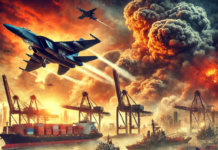
To enhance maritime safety in Europe, negotiators from the European Council presidency and the European Parliament have reached a provisional agreement to amend the 2009 directive regarding the investigation of accidents within the maritime transport sector.
This revised legislation constitutes a component of the broader ‘maritime safety’ legislative package.
“We have worked hard to agree on this proposal with the Parliament in record time. Today’s agreement sets a milestone for safer and cleaner maritime transport in Europe while safeguarding the competitiveness of our shipping sector,” stated Paul Van Tigchelt, Belgian deputy prime minister and minister of justice and the North Sea.
The revised directive seeks to streamline and elucidate the current framework governing accident investigations in the maritime transport sector. By expanding its scope to encompass smaller fishing vessels, alongside modifications in related directives concerning port state control and flag state requirements, the safety of fishing vessels within European waters is set to improve.
Specifically, the new directive aims to achieve the following objectives:
Enhance the safeguarding of fishing vessels, their crews, and the environment by encompassing fishing vessels under 15 meters within the directive’s purview. This inclusion ensures that incidents resulting in fatalities or vessel loss will undergo systematic and standardized investigation processes.
Provide clarity on definitions and legal provisions to ensure that member states’ accident investigation bodies promptly and uniformly investigate all relevant accidents.
Strengthens the capability of accident investigation bodies to conduct and report on accident inquiries promptly, proficiently, and independently and update various definitions and references to align with pertinent EU legislation and International Maritime Organization (IMO) regulations, thereby ensuring coherence and precision.
The co-legislators have maintained the essence of the Commission’s proposal while introducing several amendments aimed at clarifying existing rules and aligning them more closely with international regulations. These changes are intended to facilitate consistent accident investigations across the EU. Furthermore, there is a focus on strengthening the independence of accident investigation bodies, ensuring the confidentiality of their findings, and reducing administrative burdens.
The provisional agreement covers various aspects, including aligning with the IMO casualty investigation code regarding the obligation to inform maritime security authorities of suspected offences.
Additionally, provisions related to conformity checks have been adjusted to align with other EU maritime legislation, such as the maritime equipment directive. A voluntary approach to implementing a quality management system for national investigation authorities is proposed, supported by implementation guidance. Moreover, a 2-month deadline for preliminary assessments in accidents involving smaller fishing vessels has been introduced.
Overall, the revised directive strikes a delicate balance between maintaining high shipping standards, safeguarding the competitiveness of the European shipping sector, and managing costs effectively for operators and member states’ administrations.





